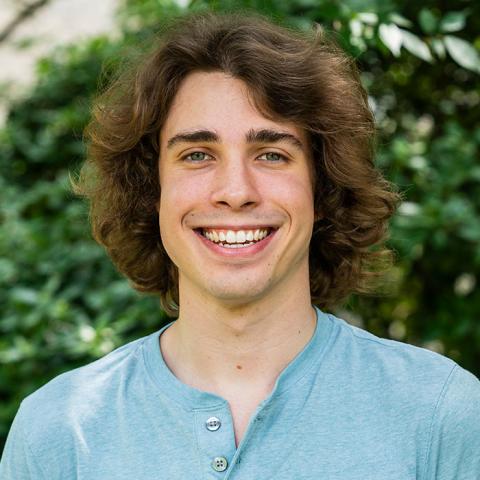Summer Centered: Nasanbayar Ulzii-Orshikh ’22 Iterates on Education

Ulzii-Orshikh in front of the MIT Media Lab.
Details
The rising sophomore brought an "antidisciplinary" lens to computational thinking as he designed a computer science course in collaboration with the MIT Media Lab, taught it in Mongolia, and then analyzed the findings to help educators.
Nasanbayar Ulzii-Orshikh ’22 is aiming to bring a creative renaissance to computer science education. He worries that, because of the discipline’s focus on algorithms and programming languages, computer science classes—particularly at an introductory level—may unintentionally fail at fostering the creative and iterative mindsets that are increasingly important in the modern age. To address this challenge, Ulzii-Orshikh is designing a course curriculum where students create projects based on their passions and learn to iteratively make improvements based on feedback.
Funded by the Marian E. Koshland Integrated Natural Sciences Center and Center for Peace and Global Citizenship, Ulzii-Orshikh is spending his summer creating this course, teaching it to students in Mongolia, and then analyzing the experience at the Massachusetts Institute of Technology (MIT), where he aims to tie it into the larger body of research on creativity in computer science.
“My main project is called ‘Creative Learning,’ where I, in collaboration with my supervisor, got to teach a course at Tomujin Academy in Mongolia that focused on computational thinking and, specifically, students’ ability to tinker and iterate,” said Ulzii-Orshikh. “I spent the next five weeks performing a qualitative analysis of the students’ performances and expanding it into a broader discussion of computational thinking research at the MIT Media Lab’s Lifelong Kindergarten Group.”
An important part of Ulzii-Orshikh’s project is an emphasis on iteration: he wanted to convey to his students the importance of testing and re-testing, seeking out both quantitative and qualitative feedback, and remaining positive in the face of criticism. The importance of iteration is something he learned while working on research projects with Haverford professors this past academic year.
“Last year, I worked with professors Lou Charkoudian and Suzanne Amador Kane on their respective research projects,” he said. “I think they not only armed me with the technical tools of qualitative analysis and scientific iteration, but also, most importantly, empowered me in a way that I could, despite being a first-year, still contribute to the broader academic community.”
The liberal arts nature of Haverford’s curriculum has led Ulzii-Orshikh to believe that most problems could benefit from an interdisciplinary approach. By considering problems from a variety of technical and creative standpoints, he reasons that you gain a richer understanding of both the problem as well as the tools used to solve it.
“I am personally intrigued by interdisciplinary projects that let you specialize in a field,” said the prospective physics, computer science, or psychology major. “This summer project combines both computer science and psychology in the context of STEM, which allows me to sail deep into these disciplines while keeping the project practically relevant.”
This belief was further ingrained in Ulzii-Orshikh by the second half of his summer research, when he was at MIT working alongside other students conducting self-directed interdisciplinary research.
“Being surrounded by visionary people who are all doing creative projects at the lab made it clear how interdisciplinary—or even ‘antidisciplinary’—solving problems in life can be,” he said. “Having a wider range of insights into how both machines and humans work is vital for building something that fits into a real-life context, which I think truly highlights the importance of a liberal arts education.”
For Ulzii-Orshikh, this summer research experience also forced him to overcome his anxieties about launching into new experiences. In order to ask his students to push themselves creatively and learn to iterate, he needed to first grow comfortable with these processes himself so he could understand the best ways to support his students.
“What was both terrifying and exciting to me was how I could throw myself into these messy and uncertain conditions, dig deep into an iterative mindset myself, and find the whys, hows, and so-whats along the way,” he said.
Ultimately, though, the experience was wildly rewarding—Ulzii-Orshikh notes that his students responded positively to his curriculum and learned to see iteration as central to creative and technical endeavors.
“Hearing a student say, ‘I always used to be scared of feedback, but now I seek it,’ just totally made all the energy worth it,” he said.
“Summer Centered” is a series exploring our students’ Center-funded summer work.




